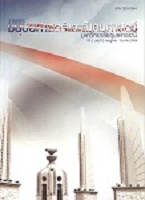การพัฒนาผลสัมฤทธิ์ทางการเรียนวิชาวิทยาศาสตร์ของนักเรียนชั้นมัธยมศึกษาปีที่ 1 ด้วยวัฏจักรการเรียนรู้แบบสืบเสาะทางวิทยาศาสตร์
Main Article Content
บทคัดย่อ
การวิจัยนี้มีวัตถุประสงค์เพื่อ 1) เพิ่มผลสัมฤทธิ์ทางการเรียนของนักเรียนระดับชั้นมัธยมศึกษาปีที่ 1 ที่เรียนวิชาวิทยาศาสตร์พื้นฐาน เรื่องสารในชีวิตประจำวันให้สูงกว่าผลสัมฤทธิ์ทางการเรียนเรื่องเดียวกันในปีการศึกษา 2549 2550 และ 2551 โดยใช้กระบวนการจัดการเรียนรู้แบบสืบเสาะหาความรู้ 2) ให้นักเรียนมีคะแนนผลสัมฤทธิ์ทางการเรียนเรื่องนี้โดยเฉลี่ยร้อยละ 70 ขึ้นไปของคะแนนเต็ม และให้มีนักเรียนที่ผ่านเกณฑ์ดังกล่าวจำนวนไม่น้อยกว่าร้อยละ 70 ของจำนวนนักเรียนทั้งหมด และ 3) เปรียบเทียบคะแนนแต่ละสาระจากหน่วยการเรียนรู้ที่ 2 เรื่องสารในชีวิตประจำวัน โดยเครื่องมือที่ใช้ในการวิจัย ประกอบด้วย 1) แผนการจัดการเรียนรู้แบบสืบเสาะหาความรู้ 15 แผน และ 2) แบบทดสอบวัดผลสัมฤทธิ์ทางการเรียนเรื่องสารในชีวิตประจำวัน กลุ่มตัวอย่างได้แก่ นักเรียนระดับมัธยมศึกษาปีที่ 1 ภาคเรียนที่ 1 ปีการศึกษา 2552 โรงเรียนปทุมราชวงศา อ.ปทุมราชวงศา จ.อำนาจเจริญ จำนวน 91 คน ระเบียบวิธีวิจัยเป็นแบบการศึกษาเฉพาะ กรณีโดยให้การทดลอง 1 ครั้ง ผลการวิจัยพบว่า 1) ผลสัมฤทธิ์ทางการเรียนของนักเรียนในปีการศึกษา 2552 มีคะแนนเฉลี่ยเท่ากับ 74.95 ซึ่งสูงกว่าผลสัมฤทธิ์ทางการเรียนในปีการศึกษา 2549 2550 และ 2551 ที่มีคะแนนเฉลี่ยเท่ากับ 55.20 51.59 และ 55.40 ตามลำดับ อย่างมีนัยสำคัญทางสถิติ (p<0.05) 2) ผลสัมฤทธิ์ทางการเรียนของนักเรียนในปีการศึกษา 2552 สูงกว่าร้อยละ 70 ของคะแนนเต็ม และมีจำนวนนักเรียนที่ได้คะแนนผ่านเกณฑ์ร้อยละ 70 ขึ้นไป จำนวนร้อยละ 72.51 ของจำนวนนักเรียนทั้งหมด และ 3) สาระที่นักเรียนมีคะแนนผ่านเกณฑ์ร้อยละ 70 ได้แก่ สารเนื้อเดียว สารละลาย การแยกสารผสม สารที่เป็นกรด สารที่เป็นเบส สารที่ใช้ทำความสะอาด สารที่ใช้ในบ้าน และการสกัด ตามลำดับ โดยคิดเป็นร้อยละ 61.53 ของสาระทั้งหมดในหน่วยการเรียนรู้นี้ จากผลการวิจัยสรุปได้ว่า การจัดการเรียนรู้แบบสืบเสาะหาความรู้สามารถพัฒนาผลสัมฤทธิ์ทางการเรียนของนักเรียนไปสู่ระดับเกณฑ์เป้าหมาย และยังช่วยให้นักเรียนเข้าใจเนื้อหาส่วนใหญ่ในสาระการเรียนรู้นี้
Developing Matthayom Suksa 1 Students’ Achievements in Learning Science Using Science Inquiry Learning Cycle
The objectives of this study were to 1) increase the achievement of Matthayom Suksa 1 students in the 2009 academic year in learning basic science in the area of chemistry in everyday life compared to those of academic years 2006-2008, 2) enhance students’ achievement of a total score of ≥70%, and increase the number of students who achieved a criteria of ≥70% to 70% of the total number of students, and 3) compare the students’ achievements in each topic of this learning unit. The research tools were inquiry-based lesson plans, and the achievement test. Ninety-one students were purposively selected from the Matthayom Suksa 1 students who enrolled in the first semester of the 2009 academic year at Pathum Ratwongsa School, Pathum Ratwongsa, Amnat Charoen. The research methodology was a one shot case study. The research findings were 1) the mean score of the post-achievement test was 74.95%, significantly higher than the post achievement tests of the 2006, 2007, and 2008 academic years (p<0.05), 2) 72.51% of the 2009 students achieved the criteria score of 70%, and 3) the topics of homogeneous mixture, solution, acid, base, detergent, household chemical, and extraction were 8 of 13 topics in this learning unit that more than 70% of the students achieved ≥70% score. Therefore, it was concluded that learning science through the use of the inquiry learning cycle allowed 70% of students to achieve the learning goals at a set criteria level and understand the content in this learning unit.
Article Details
บทความที่ได้รับการตีพิมพ์เป็นลิขสิทธิ์ของวารสารมนุษยศาสตร์และสังคมศาสตร์ มหาวิทยาลัยอุบลราชธานี
ข้อความที่ปรากฏในบทความแต่ละเรื่องในวารสารวิชาการเล่มนี้เป็นความคิดเห็นส่วนตัวของผู้เขียนแต่ละท่านไม่เกี่ยวข้องกับมหาวิทยาลัยอุบลราชธานี และคณาจารย์ท่านอื่นๆในมหาวิทยาลัยฯ แต่อย่างใด ความรับผิดชอบองค์ประกอบทั้งหมดของบทความแต่ละเรื่องเป็นของผู้เขียนแต่ละท่าน หากมีความผิดพลาดใดๆ ผู้เขียนแต่ละท่านจะรับผิดชอบบทความของตนเองแต่ผู้เดียว


